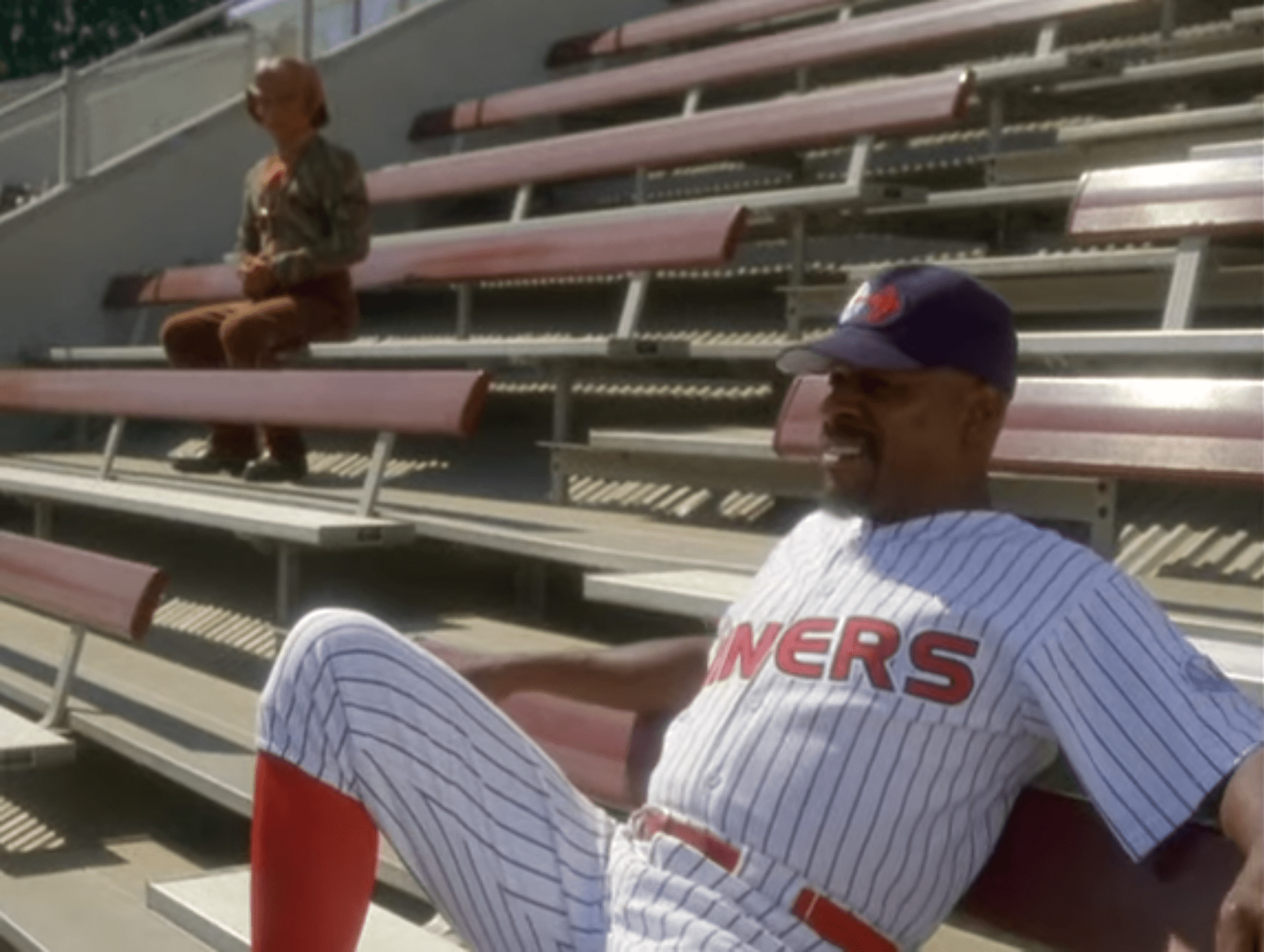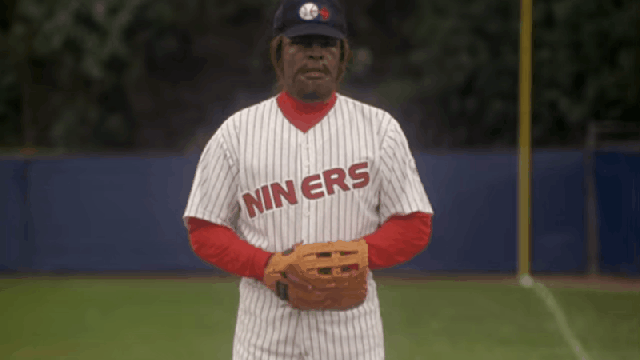Twenty-two years ago today, Deep Space Nine — at the height of its dark, complex, morally nuanced depiction of war, and the impact it has on utopia — delivered a poignant message about the concept of accepting loss. It did so in a comedy holodeck baseball game, and the result cemented itself as one of the all-time greatest Star Trek episodes there ever was.
Season seven’s “Take Me Out to the Holosuite” reads, at first, like a thoroughly absurd, almost un-Trek-like escapade, especially to a series like Deep Space Nine (the Dominion War is exalted as the franchise navigating its ethically darkest hours with a light that is daring to flicker out). Captain Sisko calls his staff to a dire-sounding meeting, only to reveal that the reason for his graveness is that the visiting captain of the T’Kumbra, Solok — the vampiest Vulcan to have ever vamped in a Star Trek show — has challenged the staff to a team exercise with his own all-Vulcan bridge crew. But it’s not just any match: it’s baseball.
[referenced id=”1159032″ url=”https://gizmodo.com.au/2019/05/star-treks-ira-steven-behr-looks-back-on-the-complex-legacy-of-deep-space-nine/” thumb=”https://gizmodo.com.au/wp-content/uploads/2019/05/04/gwn7cpz3pzzqb6atdojv.png” title=”Star Trek’s Ira Steven Behr Looks Back On The Complex Legacy Of Deep Space Nine” excerpt=”Twenty-six years after it first debuted, Star Trek: Deep Space Nine is now seen as one of the franchise’s finest entries. The series was a dark examination of the moral push and pull on Starfleet’s finest ideals in a time of war, that examined the, at times, bitter cost of…”]
Baseball is a running theme throughout Deep Space Nine. In Trek’s fiction, baseball is a dead sport by the late 23rd-century — but Sisko is obsessed with it, both as a historical artefact and a recreational pastime. It helps him bond with his son, Jake, and provides a respite from the politics of managing a society like the hodgepodge of factions and diasporas that call Deep Space Nine home. The baseball that Sisko keeps on his office table is one of the show’s most profoundly important pieces of iconography; used when Sisko first explains linear time to the Prophets when he encounters them in the show’s opening episodes, it comes to represent the man himself when Deep Space Nine is forcefully abandoned to Dominion occupation in the war’s darkest hours. Baseball isn’t just a sport: it is Benjamin Sisko’s.

Solok’s challenge — born out of a decidedly-un-Vulcan, but actually extremely Vulcan grudge he and Sisko developed in the academy over his stuffy superiority when it comes to managing emotions — is a deeply personal one to the captain. Being Sisko, Man of a Million Grudges, he takes it to heart. It’s beautiful that something as silly as a supposedly friendly ballgame (which Sisko has to haphazardly teach to his motley crew in time to face Solok’s team) so utterly exposes the human imperfection that makes Sisko such a compelling character in the first place. In a perfect world, this would be a friendly meeting between fellow officers of the Federation, a social experiment, a chance to see how history viewed such a pastime that no longer exists in this advanced civilisation.
But Star Trek is made up of people, deeply imperfect things, and Deep Space Nine is a shining example of this. So Sisko — in an absurdist parallel to paths he went down dealing with everything from the Cardassians and the rise of the Maquis guerrilla group to the Dominion itself — takes this lighthearted game and turns it into an obsession where he mustn’t just crush Solok, but prove once and for all that he was always right about snotty Vulcans. After hastily getting the bridge crew (and a few friends, most notably Rom and Leeta) fashioned into the Niners, a bunch of loveably clueless go-getters who have no idea how to play baseball in the slightest, Sisko’s unwillingness to not just not lose, but let Solok win, is a disaster waiting to happen.

The team’s first practice ends with most of them in Bashir’s sickbay, leading to Sisko making some morally questionable uses of his command privilege to get some experts (mostly his girlfriend Kassidy) to fill the gaps in his arsenal. But repeated practice with his team sees Sisko grow increasingly infuriated with poor Rom, who can’t swing a bat to save his life. Ultimately, Sisko can’t take it anymore, even if Rom is trying; he boils over and lashes out at the Ferengi in front of his fellow Niners, prompting them to quit until Sisko just lets Rom have fun with the rest of them. But Sisko is past having fun with the sport he earnestly, truly loves: he just wants to win, whatever it takes. Even if whatever it takes risks compromising the friendships he has built with his crew.
Deep Space Nine is a series filled with subverting expectations, so it’s perhaps not too surprising that “Take Me Out to the Holosuite,” a story almost aching for an underdog story of victory, concludes with our Niners getting utterly steamrolled by Solok’s team. At that point, we’d come to love these characters over six seasons of TV, and seen them, at the height of the show’s darkest chapters, come together and have fun in a way they rarely have. Despite the fact that the episode makes it very clear they don’t have a chance in hell at winning, we so desperately want them to eke out that victory. They’re good people, just having fun. Give them the win!

But that’s the point, and it’s the point Sisko has to learn over the course of the episode. As their drubbing to Solok’s Logicians continues, his emotions boil over again, leading to his ejection to the holographic stands, alongside Rom — who still showed up to cheer his friends along even after Sisko cut him. It’s there that the captain is given the literal and metaphorical distance to re-realise just why he loves baseball so much, the poetry of its chaotic randomness reflecting in a goofy misplay by Nog that somehow ends with the Niners getting the third out they needed to change play against the Logicians. In finally accepting that he wasn’t going to win his decade-long grudge against Solok, Sisko not only has to learn to let go and confront the idea of loss but to re-embrace the people he’s losing with.
Finally learning to lean into the fun and putting Rom on as an impromptu batter, the Niners score their first run of the entire match after the hapless Ferengi inadvertently bunts, while utterly failing to realise that’s what he was meant to do. The Niners are so overjoyed that they end the match then and there, much to Solok’s furious confusion — a fury that continues on into the post-game celebrations in Quark’s bar, where the Vulcan is denied the chance to rub his win in against Sisko. He and the rest of the Niners are too busy happily celebrating their one little moment of glory like there’s no tomorrow.

Beyond denying Solok his petty preening, the Deep Space Nine crew has learned that sometimes loss is inevitable — but they’ve also learned to take a win where you can, no matter how small in the face of that loss, and that sometimes there are no better people to lose alongside than those closest to you.
They just didn’t happen to learn it in the field of battle, in a war that threatens to envelop the Federation that they all stand for. They learned it in a holographic game of baseball from a Ferengi who doesn’t know how to bunt. Twenty-two years later that still remains a beautiful, wonderful thing.
For more, make sure you’re following us on our Instagram @io9dotcom.
